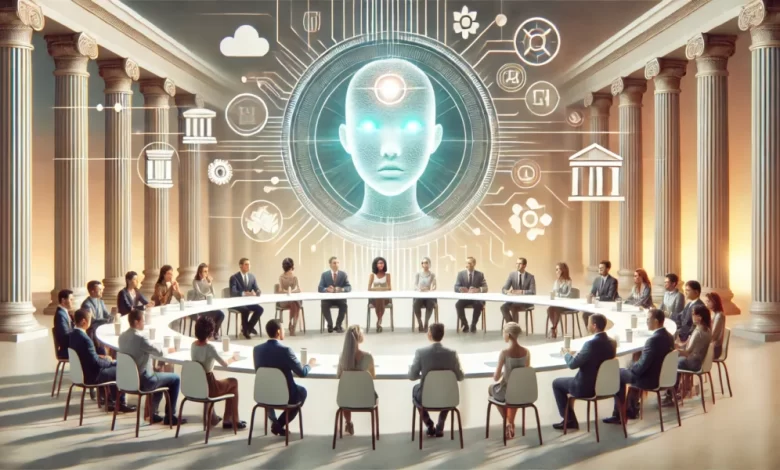How AI is Shaping the Future of Democratic Dialogue

In today’s politically polarized world, finding common ground on complex social and political issues is becoming increasingly challenging. As societies become more diverse, disagreements on crucial issues such as climate change, immigration and economic policy have only increased. Bringing people together to find consensus on complex issues often takes time, resources and a level playing field where all voices can be heard.
Recent developments in artificial intelligence have opened up new opportunities for technology to help facilitate complex dialogues on divisive topics. For example, AI-powered large language processing (NLP) models have become sophisticated enough to interpret complex language and discern differences in sentiments and perspectives. Furthermore, AI systems are being designed with features such as real-time sentiment analysis, bias detection, and adaptive feedback. These skills make them particularly suited to help facilitate fair and balanced discussions.
This potential has caught the attention of Google DeepMind researchers who want to explore the promise of AI in facilitating civil discourse. Inspired by the ideas of philosopher Jurgen Habermasthey have the “Habermas machine” (HM), a tool to support civil discourse and help groups discover shared values. The article explores the question: can AI really help us find common ground? It also looks at how the Habermas Machine (HM) can facilitate democratic consultation.
The Habermas machine
The Habermas Machine is an AI tool designed to analyze individual opinions and create a unified group statement. The machine works as a ‘caucus mediation’. Participants start by sharing their thoughts. The AI then combines these into a concept statement. The participants then assess and critique this concept. The AI uses its input to generate a revised statement that attempts to reach broader agreement, capturing both majority views and minority criticism.
This machine employs two specialized LLMs for this task. The first is a generative model that creates statements that reflect different views of the group. The second is a personalized reward model that evaluates these statements based on how likely each participant is to agree with them. The generative model is refined using supervised tuning, while the reward model is iteratively improved based on the reward signals.
The machine was tested with more than 5,000 participants from across Great Britain. Some joined through a crowdsourcing platform, while others were recruited by the Sortition Foundation, a nonprofit organization that organizes a citizens’ assembly. The participants were divided into groups and testing took place in two phases. First, the machine summarized collective opinions. It then mediated between groups to help identify common ground.
The promise of AI in uncovering common ground for democratic dialogue
The study highlights the potential of AI to find common ground in democratic dialogue. A key finding was that AI-mediated discussions led participants to shift toward shared views. Unlike unmediated discussions, which often reinforced existing beliefs, AI helped participants reconsider their positions, bringing them closer to a middle ground. This ability to promote alignment shows that AI can be a valuable tool in dealing with complex, divisive issues.
The study also found that both participants and independent judges rated AI-generated rulings more favorably than those of human mediators. They found the AI’s statements more accurate, informative and honest. Importantly, the AI not only amplified the opinions of the majority; it also gave weight to minority views. This feature helped prevent the ‘tyranny of the majority’ and ensured that dissenting voices were heard. Including these differing views is crucial, especially in sensitive debates, because fair representation helps avoid misunderstandings and promotes balanced discussions.
Real-World Applications of AI in Deliberative Democracy
The implications of AI-mediated consultation are significant for real-world scenarios. For example, AI can improve policy discussions, conflict resolution, contract negotiations and citizens’ assemblies. Its ability to promote balanced dialogue makes it a valuable tool for governments, organizations and communities seeking to address complex issues involving diverse stakeholders.
To test the effectiveness of the model in a practical setting, researchers organized a virtual citizens’ meeting with a representative sample of residents of Great Britain. This meeting focused on divisive topics such as immigration policy and climate action. After AI-mediated discussions, participants showed a noticeable shift toward consensus, without AI biases influencing their opinions. These findings highlight how AI mediation can potentially guide collective decision-making on critical social issues while minimizing bias.
Limitations and ethical considerations
While AI mediation is promising, it is also remarkable limits. For example, the AI model used in this study lacks fact-checking capabilities, meaning it relies heavily on the quality of participant input. Furthermore, AI-enabled deliberation requires careful design to avoid harmful or unproductive discourse. Another important consideration is the ethical role of AI in democratic processes. Some individuals may be cautious about using AI in political discussions, fearing that algorithms could unintentionally influence outcomes. Therefore, continued oversight and a clear ethical framework are essential to ensure that AI is used in ways that respect democratic values.
The bottom line
Researchers from Google DeepMind have highlighted that AI has the potential to transform democratic dialogue. They propose that AI tools, such as the Habermas Machine, can help individuals find common ground on complex issues. While AI can make conversations more accessible and inclusive, it is crucial to use it responsibly to protect democratic values.
If AI is developed thoughtfully, it can play a crucial role in facilitating collective understanding. It can help address pressing social problems by finding common ground between different perspectives. As AI technology advances, models like the Habermas Machine may become critical to navigating the challenges of modern democracy, simplifying and expanding deliberative processes for more expansive and diverse groups.






